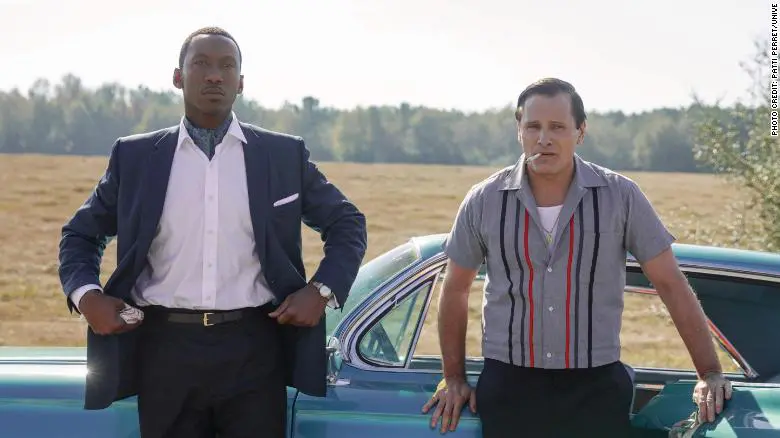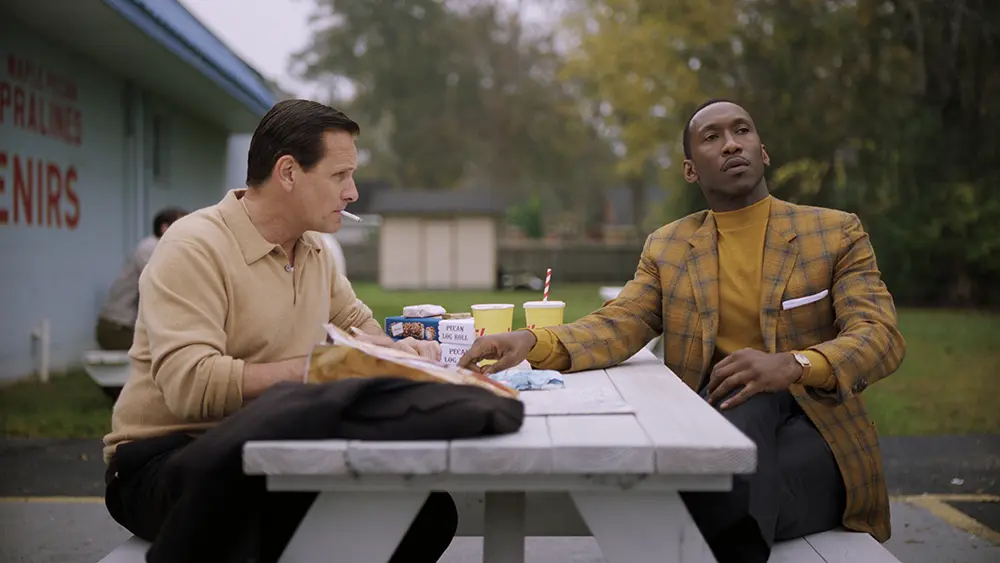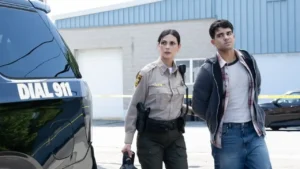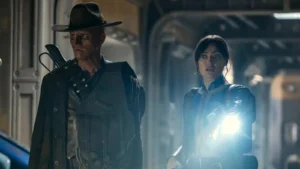Summary
Green Book is not for the cold-hearted cynic, but for the romantic moviegoer who wants nothing more to see the good in people and let that feeling wash over them.
The Negro Motorist Green Book, or more commonly just known as Green Book, was developed by a New York City postal worker named Victor Hugo Green, so the emerging African-American middle class could take their newly-bought automobiles and travel the country when Jim Crow laws were still practiced widely across the South. This was a necessary help for non-white travelers who faced “sundown” hours, where you had to leave the area by nightfall to continue segregating people of color. By the time Jim Crow laws were outlawed in 1964 by the Civil Rights Act, the Green Book slowly disappeared into obscurity; one would think it still might be needed today.
In 1962, world-renowned and African-American pianist Dr. Don Shirley (Moonlight’s Maherhala Ali) was about to begin an eight-week concert tour from New York City through the deep and very segregated South. There won’t be a plane for him to fly in. He will be driving and interviews a man who can offer the kind of safe passage so he can come back unharmed or at the very least alive. He hires a not necessarily fast-talker, but a tough one named Tony Vallelonga (Viggo Mortenson), who needs the money to support his wife (Linda Cardellini) and two boys at home after being laid off for a couple of months from his bouncer gig at the Copa. The Green Book is handed to him to navigate through the south to Shirley’s record studio.
Tony is Italian-American, born and raised in the Bronx. Even with his limited education (reportedly dropped out of school in the sixth grade), he quietly appears to be more tolerant than most, especially his friends and family. For instance, when sleeping after a long night at work, he wakes up to find his male friends and family watching the ball game in his living room.
READ: Movies like Green Book you must watch
When he asks them why they are there, they point to the kitchen, where two African-American men fix the plumbing, and Tony’s wife shouldn’t be left alone with them. When he sees them finish a drink of water that his wife gladly gave them while working on their kitchen, he is torn if he should follow his family’s old-world view while giving in to peer pressure and throw the glasses out or leave them in the sink. His wife later finds them in the garbage and is ashamed that he threw them in the can in the first place.
Green Book is based on a true story and isn’t just a backward Driving Miss Daisy, but a kindred spirit to Neil Simon’s The Odd Couple with Mortenson’s Tony as Oscar, who’s unkempt, a slob, and hasn’t found a plate of food he wouldn’t eat, while leaving a mess everywhere he goes. Ali’s Shirley is Felix, proper, trim, neat, so fussy you think he couldn’t sit in the back of the green Caprice without toppling over from the big-old stick stuck… if you catch my drift.
He puts himself on a pedestal throne, quite literally, and looks down at others, so much so he is worried when introduced Tony should change his last name to avoid it being mispronounced. Tony almost has a child-like nature while being a product of his time and environment that results in a narrow view of African-Americans, making for some snappy dialogue and humorous moments that move the film at a brisk pace.

The performances in the film are tremendous. Mahershala Ali is a wonderful actor who shows a level of vulnerability unmatched by many of his peers. He plays Shirley with quiet dignity while depicting a subtle tortured soul who uses alcohol to self-medicate the loneliness he feels not only from segregated “white” America but also among members of his own race. He is a shoo-in for an Academy Award nomination, and I would argue it’s a lead performance.
On the flip side of that coin, I continue to be amazed by Viggo Mortensen’s innate ability to disappear into any character he takes on. From playing the heir to Isildur, a mobster who made a new life for himself in a small town, an anarchist turned survivalist who reintroduces himself to the world, or a Russian strong-arm man, there is nothing he can’t morph into seamlessly, and without asking the viewer to leap of faith.
Peter Farrelly, a man, is known for such comedy classic ’90s gross-out comedies (There’s Something About Mary, Dumb and Dumber and Kingpin), directed and co-wrote Green Book, shows a deft touch previously not seen in his other works. His film is for the hopeless romantic moviegoer in all of us and not the cold-hearted cynic. It’s for the viewer that still believes in films that look for the good in people, in any situation, under harsh circumstances, and allow that feeling to wash over them. If you are the former, despite the one-sided view the film might take through Tony’s eyes (the film is co-produced and written by his son Nick Vallelonga), give into Farrelly’s film, and your best bet is to let it wash over you as well.
Interesting side note: when the credits roll and pictures of the real subjects appear on screen, if the real-life Tony Vallelonga, AKA Tony Lip, looks familiar, he should. He turned to act and is the same man who played Carmine Lupertazzi in The Sopranos. Who knew he had such an intimate knowledge of the book from firsthand experience. With that, Paul Harvey might say, “good day.”




